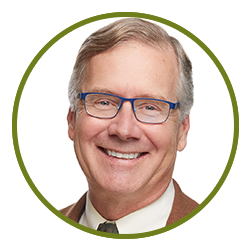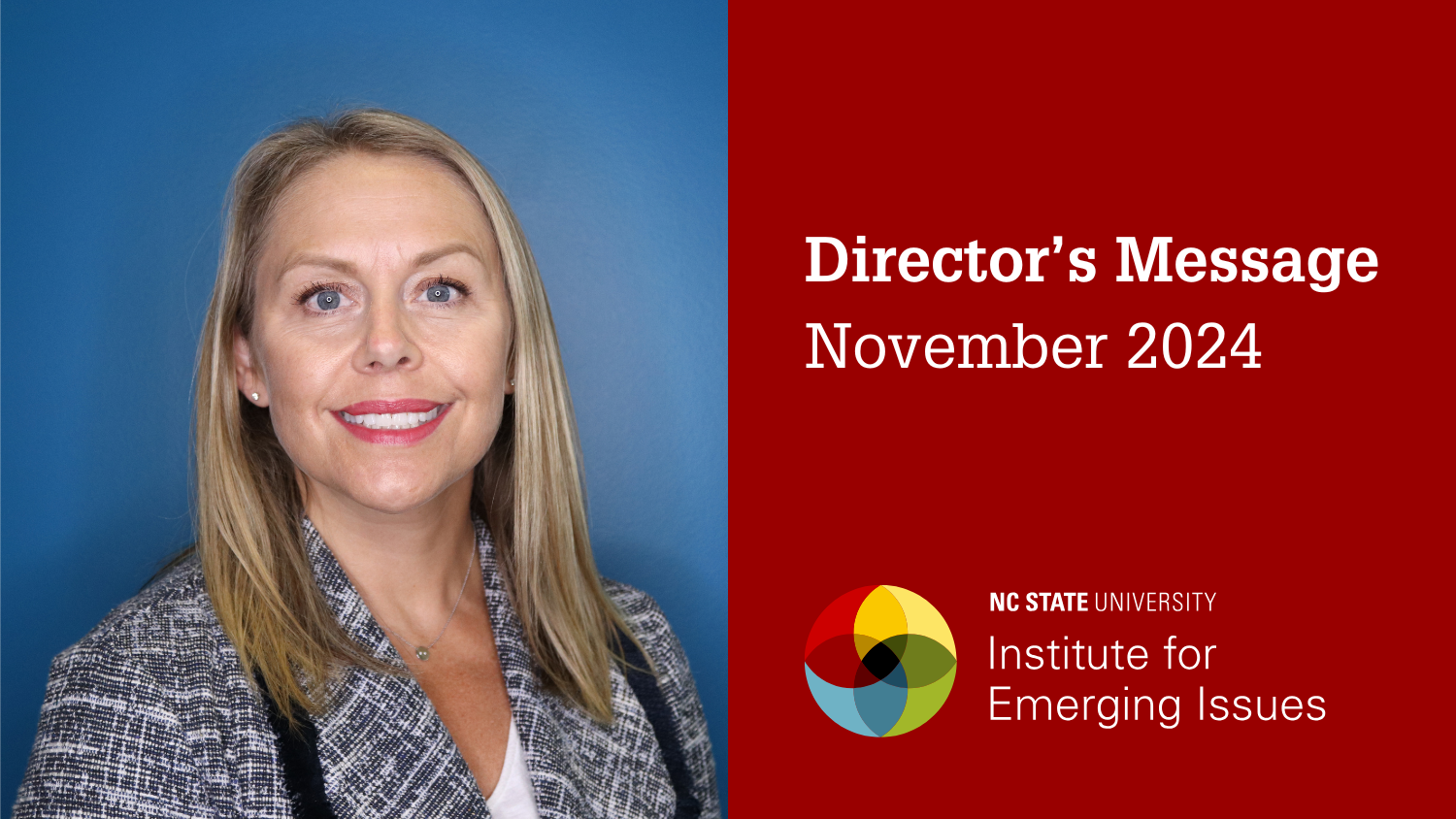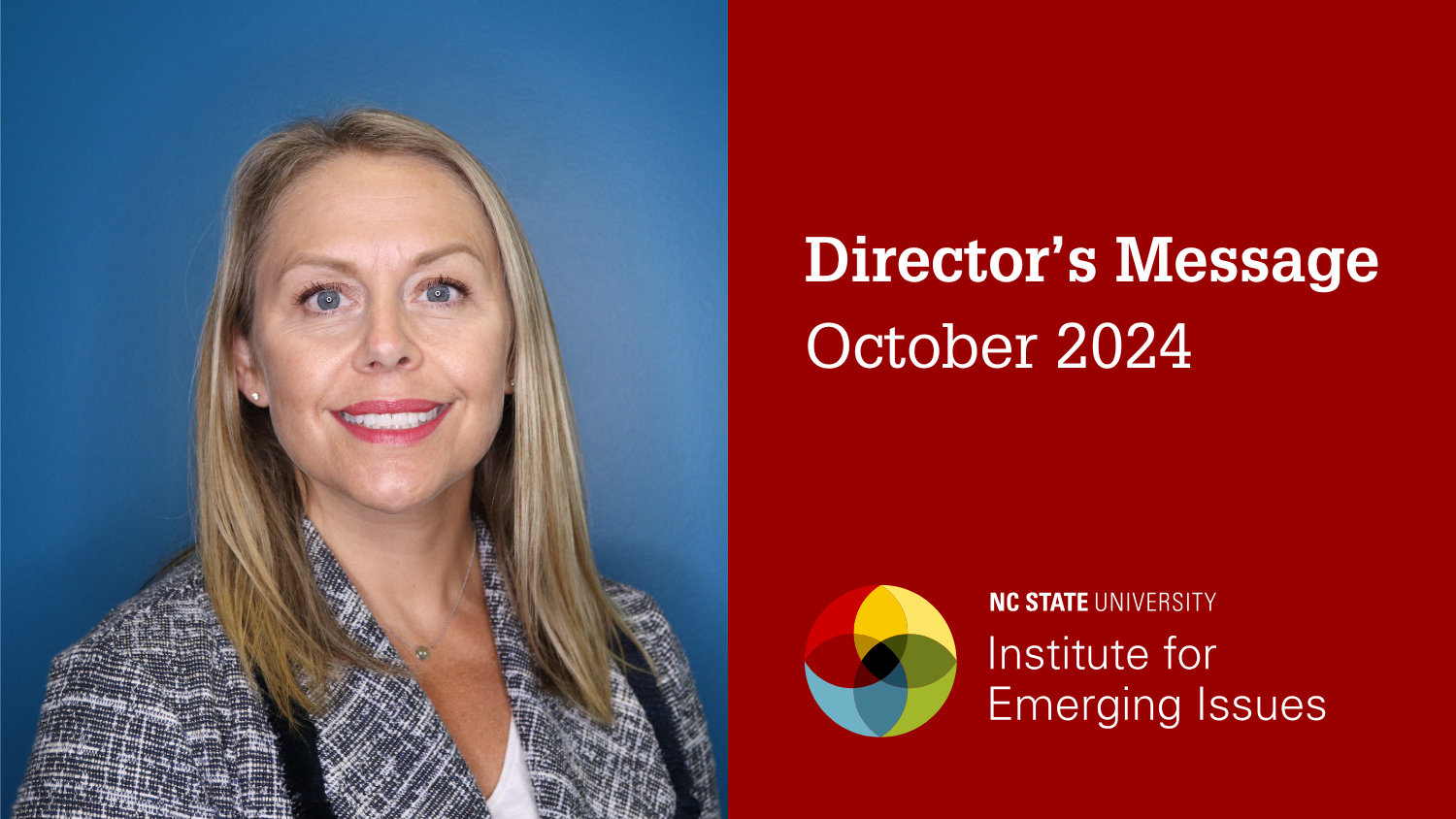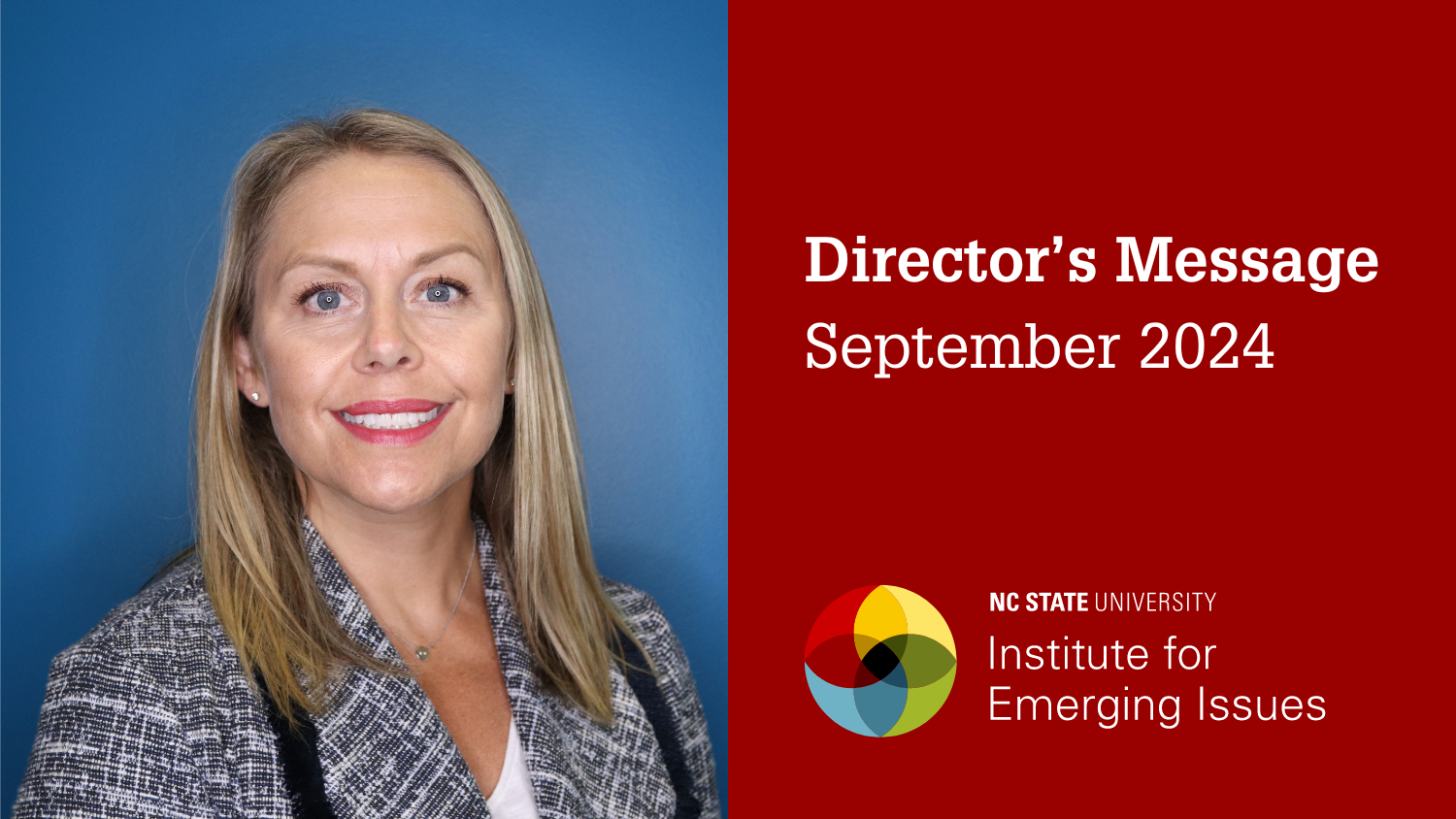Director’s Log | October 2019
 Friends: It was great to be with so many of you (and virtually with you, for those of you who were watching via our livestream or the broadcast on Public Media NC’s North Carolina Channel) at our Emerging Issues Forum, ReCONNECT to Economic Opportunity, in Charlotte earlier this month. Thanks to the great work of forum manager Alicia James and our operations and communications teams, it was a day to listen to and learn from smart people doing great thinking and doing with a group that I called “the invisible generation” – our 25-54 year-old population. We pay a lot of attention to people’s education up until then, but once people graduate or drop out of our traditional school age, they disappear and we assume all is well.
Friends: It was great to be with so many of you (and virtually with you, for those of you who were watching via our livestream or the broadcast on Public Media NC’s North Carolina Channel) at our Emerging Issues Forum, ReCONNECT to Economic Opportunity, in Charlotte earlier this month. Thanks to the great work of forum manager Alicia James and our operations and communications teams, it was a day to listen to and learn from smart people doing great thinking and doing with a group that I called “the invisible generation” – our 25-54 year-old population. We pay a lot of attention to people’s education up until then, but once people graduate or drop out of our traditional school age, they disappear and we assume all is well.
But we know that’s not the case. There are 1.35 million people in our state in that age group with just a high school education or less, and we know those folks are more likely to be making less than sustainable wages. Another 905,000 people have some college, but no degree, which means that in addition to not getting the benefits that come with a degree, they also may be carrying student debt.
The October 15 Forum spent a good deal of time looking at how we could help adults get the kind of education and skills they may have missed the first time: that could be a 2-year or 4-year degree, but it could also be a certification that involves a shorter-term piece of training.
Over the next month, we’ll be putting together some of the key recommendations lifted up during the Forum in an “impact report,” but while we’re doing that, I’ll just share three quick observations about some of what we learned:
1. One size doesn’t fit all: There are some boundaries in the early years of our education system that make the job of educators slightly easier: required attendance for the first few years of school, then societal norms that keep a lot of people learning beyond high school. Adults, by contrast, need to choose education, and there is a lot of competition for their attention. They have jobs. Children. Aging parents. Limited time. And yet the need for education continues. As NC Community Colleges President Peter Hans put it during the Forum: “Education in the future is likely to be shorter in duration and occurring more frequently.”
And even if they may think they need more education, they may not have had a great experience the first time, and it’s really hard to figure out what to study. During the Forum, we heard from community colleges about their new efforts to convince adults to come back (the NC Community College system has launched a new ad campaign emphasizing the link between education and employment called “Your Hire Education”), from universities about how to keep them enrolled (from Johnson C. Smith’s Laura Colson McLean: “It cannot be cookie cutter – every adult learner is different.”), from businesses about why they’re emphasizing promoting from within (Duke Energy NC President Stephen De May said, “we need to be investing in our workforce today to make sure we are ready for tomorrow”). We heard about Finish Line grants, veteran’s transition programs, efforts to help adults with criminal records, and from support organizations about their efforts to help overcome the very specific challenges different adult learners may face.
NC Governor Roy Cooper noted that often it is a very small thing that derails a person’s efforts to get a new credential: “A little thing like a car repair shouldn’t keep you from getting a degree.”
Other sectors, from health care to manufacturing, are figuring out how to do “mass customization” of health care delivery or product development. What can we learn from that thinking that we could apply when we are working with adult learners?
2. Silos are great for storing grain, but not for helping people: During the Forum, we heard about a wide range of funding that adults can access when they are looking to upgrade education, overcome obstacles to getting a new job or make a transition to work. There is local support from nonprofits, workforce development boards, social services, employers, and other places. What’s missing is the kind of coordination among agencies that focuses on the particular needs of particular clients.
Sarah Glover from the Greater Greensboro United Way’s Family Success Centers told the story of a client named Lisa who had all the training she needed to get a great new job. She just needed a day of child care so she could do the job interviews. She couldn’t find a funding source to pay for that care that would help her get the job because….she didn’t have a job.
That kind of short-sighted policy is what we have to find a way to change. As MC Pilon, president of the John M. Belk Endowment, observed: “We must modernize how our states think about our adult learners…this is urgent, but this is solvable.” If we are going to make a meaningful difference in moving adult learners to new, higher paying jobs, one solution will be to figure out how to climb up to the top of silos and reach across.
3. A plan is a beautiful thing: [1] North Carolina has a plan that can make a huge difference in rallying support for more adults to get that additional level of education they need. The My Future NC Commission has a goal of increasing the number of adults in North Carolina with a “meaningful credential beyond high school” from 1.3 million today to 2 million by 2030. In partnership with RTI International, IEI has begun a process of trying to find out how many people need that sort of education boost on a county level.
The goal is, like any great goal should be, “SMART” (Specific, Measurable, Achievable, Relevant and Time-Bound). And, as we heard in the Forum, the goal has buy-in from that state’s political, business and nonprofit leadership. What we’re hoping comes out of the Forum is an appreciation of how important it will be to help existing adults upgrade their skills if we are going to achieve that goal. During the Forum, we heard from Tennessee Reconnect about their intentional efforts to bring businesses, educational institutions, nonprofits and government together in a shared commitment to find adults, make it easy and affordable for them to come back, then to return to the workplace with new skills that will enable them to sustain their families.
Michelle Gethers-Clark, CEO of the United Way of Greater Greensboro, issued an even greater challenge “2 million more educated adults in NC by 2030 is good, but how about 2 million more adults with really good jobs….We could be the first state in the US to end intergenerational poverty.”
Closing speaker Reggie Bean, the Vice President for Culture, Engagement and Stewardship at Coca Cola Bottling in Charlotte, who has used his ability to network and get the next most relevant level of education at every point in his career, from inner city Detroit to the military to the corporate world, is spending much of his professional life encouraging young adults to take the same sort of proactive approach he did to developing their careers. But he also reminded everyone in the audience that we have an obligation to our fellow North Carolinians to do what we can to help. “It is up to us – we are the ones who need to act,” he said. His final challenge: “In 2030, what will we celebrate? Will we celebrate?”
Well, that’s kind of up to us. What will we do next?
______________________________
[1] Note to self: beware Google. I was sure someone must have said this before, which did not confirm this. But it did remind me what Hannibal Smith said near the end of every episode of the (original) A Team: “I love it when a plan comes together.” Even more distracting was relistening to Al Green’s 1993 classic, “Love is a Beautiful Thing” (please take the next 4:26 to enjoy true joy – I can wait).
- Categories:


